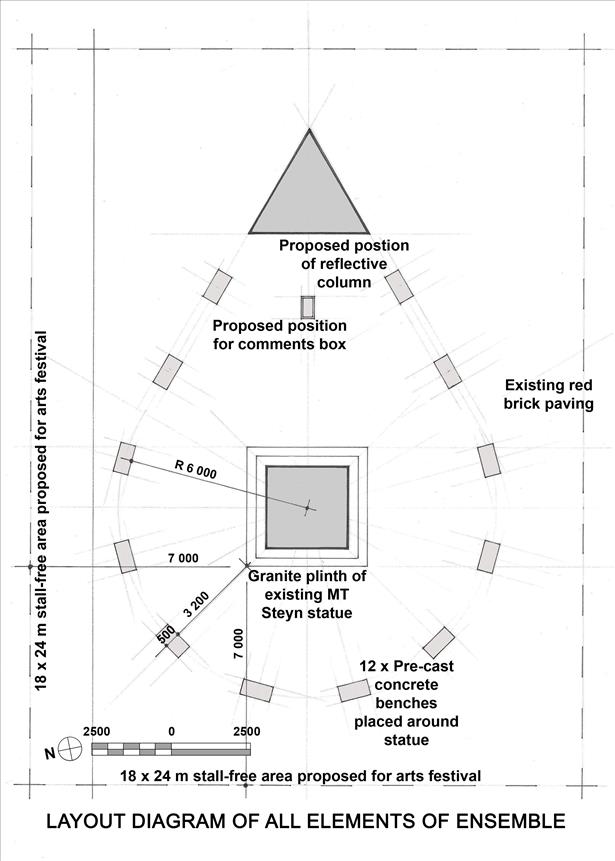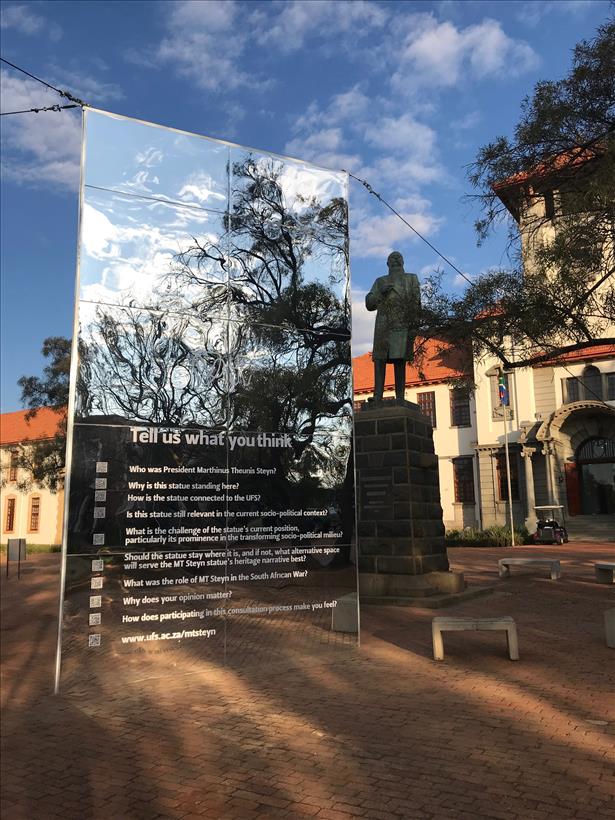Public consultation on MT Steyn statue begins with exhibition
8 July 2018
IntroductionIn line with the UFS Strategic Plan 2018-2022 and the Integrated Transformation Plan (ITP), the University of the Free State (UFS) strives to distinguish itself as an institution that will pursue the delivery of excellent quality graduates and knowledge of the region, the continent, and the globe through academic excellence, diversity, inclusivity, and through innovative and transformative thought. The ITP shows the commitment of the UFS to widen the scope and radically accelerate transformation at the university.
One of the work streams of the ITP is concerned with Names, Symbols, and Spaces. Topical at the moment is the review of the MT Steyn statue, which is situated in front of the Main Building on the Bloemfontein Campus. A public exhibition during the Vrystaat Arts Festival ensured that the review process and the statue itself remains the topic of informed intellectual conversations during the time allotted for public consultation regarding this statue.
What is the university doing?Public exhibition to keep the MT Steyn statue topicalTo contribute to the special task team’s purpose of keeping the statue topical while its current position is under review, and to demonstrate the start of the public participation process, an exhibition consisting of a reflective triangular column has been erected in front of the statue during June/July 2018 that will effectively edit the statue out of its power position if viewed from the east along the main axis from the City of Bloemfontein. Other components are a suggestion box in which comments about the position of the statue can be deposited, and a group of encircling concrete benches.
To elevate engagement and solicit comments from the university community, visitors to the campus, and other interested parties, questions appear on the smooth boards of the reflective column, each linked to its own unique QR Code with audio-format questions (see related questions below).
Send your email responses to news@ufs.ac.za.
Why are we doing this?Read more about the reasons the UFS is undertaking this step in the abridged Heritage Impact Assessment (HIA).
What is a Heritage Impact Assessment (HIA)?A Heritage Impact Assessment is a study to determine the impact of a proposed development on the cultural-heritage value of a property and to recommend an overall approach to the conservation of the heritage resource. In other words, the main aim is to promote heritage conservation—a meticulous process comprising prescribed steps.
The HIA of the MT Steyn statue included the following:- Surveying, identifying, and independently analysing the heritage issues relating to the statue in its immediate and broader physical context.
- Assessing the significance of the MT Steyn statue as a cultural resource as set out in Section 6(2) or prescribed under Section 7 of the NHRA (National Heritage Resources Act).
- Assessing the impact on the heritage resource based on the four possible modes of intervention at the statue, namely: avoidance, removal, relocation or re-interpretation, or some combination thereof.
- Assessing the sustainable heritage significance and social benefits of the proposed interventions.
What is the significance of the site where the MT Steyn statue is situated?The MT Steyn statue is situated in front of the Main Building on the Bloemfontein Campus of the UFS. The building was completed in 1909 and is a registered provincial heritage site.
The statue forms part of the ‘Presidentsplein’ that was dedicated/completed in 1984. However, the name chosen to commemorate both Presidents MT Steyn and CR Swart (removed after the student protests during February 2016) never took hold, and the open space is known as the ‘Rooiplein’ or ‘Red Square’. Why is an HIA needed for the President Steyn statue?Besides being situated on a registered provincial heritage site, the statue can be considered as public art and a monument celebrating the life and work of MT Steyn – it is also one of the finest sculptures produced by Anton van Wouw.
However, over time, statues can lose their initial meaning and can become associated with cultural and political issues. In the case of Steyn, many current students associate him with negative concepts such as colonialism, institutionalised racism, and white supremacy, among others. Therefore, we should consider a suitable conservation plan with strategies to either retain, remove, relocate, or re-interpret the statue and assess the heritage impact associated with each of these intervention options. Both the MT Steyn statue and the site where it is situated are bound by certain heritage considerations. |  A floor-plan of the public participation
exhibition around the statue. History of MT SteynRead more about who MT Steyn was here: http://bit.ly/WhoWasMTSteyn History of the statue Learn more about why the statue was erected by reading this snippet from the HIA: http://bit.ly/MTSteynStatueHist  |